- Home
- Raymond Benson
Blues in the Dark Page 4
Blues in the Dark Read online
Page 4
As she flipped through the album, she began to see more pictures that featured Blair and a distinctive black man. She was a tall woman, but he was taller, broad-shouldered, and extremely handsome. There were a few shots of him sitting at a piano, with Blair draped over the edge as if she were about to sing. Other pictures were taken in public, possibly at a nightclub, where the clientele was all black. Blair Kendrick was the only white woman there.
One 8x10 showed the two of them cheek to cheek, looking at the camera, with huge smiles and stars in their eyes.
They were in love, Karissa thought immediately. Blair Kendrick was involved in an interracial romance.
She searched through the book for identifications of the subjects. Nothing. She carefully removed pictures from the leaves to look at the backs. Blair hadn’t written on them.
Who is this man?
These were taken in the late forties. An interracial romance would have been taboo. Karissa couldn’t remember when California’s “miscegenation” laws were changed. She pulled out her phone and looked up the date.
It was October 1948. California’s Supreme Court determined that anti-miscegenation laws violated the Fourteenth Amendment of the Constitution. Of course, it wasn’t until 1967 that the U.S. Supreme Court made interracial marriage legal nationally with the Loving case. But in California, it had been legal for nineteen years.
All the same, that didn’t mean it would have been readily accepted.
Karissa looked at the 8x10 again and stared at the beautiful black man with sparkling, kind eyes.
Who are you, mister?
5
THE MOVIE
The flickering motion picture transitions to a montage of Blair Kendrick undergoing wardrobe fittings, hairdressing and makeup sessions, studio photography shoots, and more screen tests. Her voice-over continues.
“I was put through a battery of more screen tests and publicity photo shoots as part of a makeover to turn me into a Hollywood movie star. I didn’t mind at all—it was all very exciting! I couldn’t believe my good fortune. My dreams were coming true. Then, three days after I landed the part, I was invited back to Eldon Hirsch’s office on the studio lot. At 8:30 p.m., I was told that it was to finalize my contract and celebrate with dinner and drinks. This was curious, for I had already signed my contract. But I supposed having dinner with the boss was just a formality, something I had to do as part of the game.”
The screen tests had made the rounds at the studio. The various executives were impressed. The girl had charisma. Emil Winder absolutely wanted her for the role of Abigail in the picture, which was called A Kiss in the Night. It was a supporting part—the “bad girl”—who of course would pay for her sins at the end of the picture by dying. It was a juicy, meaty role, perhaps one that could steal the movie. Shooting was to begin the first week of December, and the release date would be as early as February or March of 1947. B movies were often made quickly, shot in two to four weeks. They utilized the services of contract players with one or two minor name stars, were usually made on existing sets, and were turned around in the editing room within a month. Add another month for publicity and promotional materials to be created, and it was ready for public consumption, often as the second feature of a double bill.
Blair’s deal was a standard seven-year contract exclusive to Ultimate Pictures. She could be “loaned” to other studios if she was wanted by them, but Eldon Hirsch had to approve the moonlighting and Ultimate would receive 25 percent of her earnings. It was the way of the studio system. Some of the big stars were balking at the unfair, one-sided contracts. Olivia de Havilland had already won a Supreme Court decision in 1944 that stated a seven-year contract meant exactly that—seven calendar years. Prior to the ruling, studios didn’t count actual days an actor wasn’t working, thus sneakily extending the contract beyond the designated term.
It didn’t matter to Blair. She was thrilled to be under contract with a Hollywood studio. She was about to make a major motion picture, and she would soon be hobnobbing with Tinseltown’s elite.
When she arrived at the studio that evening, she stopped at the gate per procedure. She had already been introduced to Barney Johnson, an old-timer security man who had worked the gate for nearly twenty years. Chubby and all smiles, he was obviously taken with Blair’s charm.
“Good evening, Miss Kendrick! How are you?”
“Fine, Barney. I have an appointment with Mr. Hirsch.”
“Drive right on in. You can park in Lot C by the administrative building. Nice car you got there!” He patted the top of the brown 1941 Oldsmobile Series 60 sedan.
“Thank you, Barney. I bought it yesterday. It’s used, made before we went to war. But I think it runs all right. I’ve never owned a car in my life. I learned how to drive in Chicago, though, and got my license there. I guess I’ll have to get it changed for California, won’t I?”
“Yes, ma’am, eventually I think you do. I’m sure there’s no rush. It’s a beauty.”
“Thank you, Barney. See you later!”
She parked in the designated lot and got out. Blair eyed her wristwatch—she was a bit early, but the sun had already set. She wore a black V-neck dinner dress, a pearl necklace that was a sixteenth-birthday gift from her grandmother, stockings, and heels. She had no idea what Hirsch had in mind, but she wanted to look the part of a Hollywood star.
The building was practically deserted. Another security guard would normally be stationed inside the front door, but it was after hours. She knew the way to Hirsch’s inner sanctum. His secretary, Camille Something-or-Other, was not at her desk. The lights were out. The only illumination came from the bottom slit of the closed door at the end of a long hall.
This can’t be normal, she thought. Nevertheless, she took a deep breath, thrust her shoulders back, and marched with purpose down the corridor. Before she reached the door, it opened. Eldon Hirsch stood there, dramatically backlit.
He was wearing a satin bathrobe.
“Blair, my dear! Come in, come in. You look absolutely stunning. My, my.”
“Uhm, thank you, Eldon.” She didn’t move.
“Please. Come in.”
“Are we … are we having dinner?”
“Indeed, we are. The meal will be served in a while. We shall have drinks first and toast your future with Ultimate Pictures!”
She moved past him into the spacious room. Gold was the operative word in describing its color. The drapes, the carpet, and the lighting all glowed with a golden sheen. The studio mogul’s office was as big as a basketball court in floor space. On one side was an elegant dinner table that sat ten people. It was covered with a white tablecloth and was set for two, one setting at the head of the table and the other directly at a right angle on the end. Lit candles provided “atmosphere.” The middle of the room sported a sitting/conference area with comfy chairs and a couch, a coffee table, and plenty of ashtrays. The far end of the space was dominated by Hirsch’s massive desk, which was big enough for six executives. His private bathroom was off to the side of the sitting area. There were no windows—just plenty of golden drapes and paintings by impressionists. Blair had no idea if these were originals or not, though she suspected they were.
“May I suggest a glass of champagne to start off our glorious evening?”
“Sure. Eldon, you’re wearing a bathrobe.”
He grinned broadly. “I like to be comfortable in the evenings. I often work late. I shower after everyone’s gone home for the day, and I put on silk. Do you like it?”
Seeing that he was more than fifty pounds overweight and thirty or forty years older than she, Blair almost told the truth. Instead, she said, “You look very … relaxed.” As for herself, she was beginning to feel a great deal of anxiety.
Hirsch went to the bar on one side of the room, pulled a bottle out of an ice bucket, expertly popped the cork, and poured two glasses that were already sitting on top of the bar. He handed one to her and said, “To the new star of Ult
imate Pictures. Cheers.” He clinked her glass.
“Thank you, sir.” She sipped the bubbly liquid and felt a tingle run down her spine.
“You know how I knew you were the perfect girl to play Abigail?”
“How?”
“When you spoke with that sexy Chicago accent.”
She rolled her eyes. “Oh, hmpf, that.” She dived into it and said, “Dere’s no way you’re goin’ to get me to talk dat way tonight.”
“Oh!” He opened his arms. “That makes me just want to squeeze you!”
She ducked and smoothly maneuvered out of reach. Opening her purse, she pulled out a pack of cigarettes.
“Pardon me, Blair, I should have offered you a cigarette. Here, have one of mine.” He produced a gunmetal case out of the pocket of his robe and flipped it open.
“Thank you.” She took one and looked around for a lighter.
“Here you go.” From his desk, he grabbed a heavy metal lighter shaped like a small elephant. The flame shot out of the upraised trunk with a flick of the thumb. Tentatively, she leaned in with the cigarette in her mouth. He got one for himself, fired it up, and replaced the elephant. Then, he moved toward the couch.
“Let’s have a seat over here, shall we?”
Oh dear. Is this the famous Hollywood “casting couch” I’ve heard so much about?
Blair didn’t know how to react. She didn’t want to embarrass or anger him—he was the boss!—but she also felt trapped, with no alternative plan of action. Her nervousness escalated to genuine anxiety. Nevertheless, she sat on one end of the couch and crossed her legs. He plopped down way too close for comfort—as she had expected—and stretched an arm behind her on the back of the furniture.
“So, tell me about yourself,” he said. “I know you’re from Chicago. When did you come to Southern California? Did you study acting? And do legs like yours grow naturally on every girl in the Midwest?”
She laughed uneasily. “No, I’m a freak of nature. No boys in my high school wanted to date me because I was taller than them. Mr. Hirsch, I arrived in Hollywood just two weeks ago. Yours was my second audition. And I’ve never taken acting classes. There were no such things where I went to school.”
“Your second audition? My, you handled it like a pro. My dear, you’re a natural. I can tell you’re going to be a major star, Blair.” He leaned in, too near her face. “If you trust me to help you, I will make you a big star. You’ll, of course, need to follow my advice and instruction. I’ve helped many girls in their careers.”
Blair pretended to focus on one of the paintings across the room. She stood and moved toward it. “Oh, is that a Monet?”
His voice betrayed his annoyance. “Uh, no, that’s actually a … I don’t know who did it; my interior designer chose it for the office. Very different from Monet.” He followed after her, cigarette in hand.
She shrugged. “Well, art is not something I know much about. You’ve got a lot of nice art. Your interior designer has taste.” She thought perhaps if she made out to be dumb then maybe he wouldn’t be so much of a wolf. On the other hand, maybe he liked his women dumb.
Ah, she would try a different tack.
“So, Mr. Hirsch, are you married?”
He blinked and turned away. “Married? Oh, uhm, yes, I have … yes, I’m married.”
“Oh, yeah? What’s her name?”
“Beatrice.”
“How long have you been married?”
“Twelve years. But let’s not talk about—”
“You have kids?”
“Uhm, yes, a son.”
“What’s his name?”
“Justin.”
“How old is he?”
“He’s, uhm, he’s seven. Or eight.” He scratched his head and frowned.
“You don’t know hold old your son is?”
“Eight. He’s eight. Justin is eight.”
Blair sensed she had him in an uncomfortable spot. “I gather Beatrice is younger than you.”
“Uhm, yes.”
“Is this your first marriage?”
“Beatrice is my third wife. But let’s not talk about—”
“No, I find this terribly interesting!” She moved over to his desk. “What a beautiful specimen of furniture! You must feel very important working here.”
He followed her, not exactly aware that he had lost control of the conversation. “Why, yes, I do. Isn’t it magnificent?”
“And what are these?”
Lying on top of the desk were three open leather-bound portfolios. Inside, nestled into velvet-covered pieces of cardboard, were rows of coins.
“Ah, that … that is my coin collection.”
“Coin collection?”
“Yes. It’s … it’s worth a lot of money.”
“Really? How much?” she asked.
“I’d rather not say. Look here.” He pointed to one that was a dull silver color and that featured a woman in profile wearing a headband with the word “Liberty” written on it. “This is a silver dollar from 1817, called a Capped Bust Silver Dollar. Very rare.”
“Really?”
“And this one …” He turned a page in the portfolio and pointed to a silver coin showing a woman with long wavy hair. “This is the Flowing Hair Dollar, minted in the year 1794! It’s worth about …” He leaned in and whispered, “Sixty-five thousand dollars!”
“No! You’re joking!”
“I am not.”
“Oh my God! Show me another!”
He turned the page. “Well, there are quite a few in here that are very valuable. But here is the absolute most valuable, rarest coin in my collection.” He pointed to a smaller, dull gray coin with stars circling a woman’s head profile. She wore a crown. “This is a 1913 Liberty Head Five Nickel.”
“That’s a nickel?”
“Yes. Only five of them still exist that collectors know about.”
“And how much is it worth?”
“Depends on who you talk to. Could be up to a half-million dollars.”
“I don’t believe it!”
“It’s true, my dear.” Suddenly, he leaned in, as if to kiss her, but she slipped away once again.
“So, you keep these here at your office?”
“Yes, in my safe there. I thought I would show them to you this evening. That’s why I had them out.”
She went back to the bar and grabbed the champagne bottle. “Mind if I refill my glass, Eldon?”
“Go right ahead. I like a girl who takes matters into her own hands.” He strode across the room to be near her again. He started to put his arm around her back, but she skirted away.
Blair decided it was now-or-never time. She took a deep breath.
“Listen, Eldon, I like you, and I’m very grateful for the contract. I want to do my very best for you and Ultimate Pictures. But I am not the kind of girl who is going to, uhm, indulge in any whoopee with you or any other studio executive.”
His mouth dropped and, for a moment, there was a fire in his eyes.
She held up a hand. “Don’t get mad.” Then she slinked up to him and slid her palm on his cheek. “I’m just going to have to get to know you better. I’m from the Midwest. Girls from the Midwest don’t do anything naughty on a first date. This is our first date, right? So, maybe, if you’re patient, Eldon, things might work out in the future. What do you say?”
The man tensed and turned as red as a tomahto. She didn’t know if he was going to strike her or melt.
To close the deal, she leaned in, shut her eyes, swallowed her pride, and kissed him lightly on the lips. Then she swore to herself that it would never, ever happen again.
The man’s body relaxed slightly, and he resigned himself to the fact that he wasn’t going to get lucky that evening.
“That’s what I like about you, Blair,” he said. “You have chutzpah!”
6
KARISSA
Karissa had always loved movies. Her first experience in a theater was seeing a rere
lease of Disney’s Pinocchio. It had thrilled and frightened her, and yet she had sung what she could remember of “Hi-Diddle-Dee-Dee” all the way home in the car. Kids’ movies quickly became her weekend activity until she was old enough to see more adult fare. Her adoptive parents were indulgent and liberal when it came to Karissa seeing R-rated material, especially if they deemed the pictures to have socially important messages. By the time she had experienced the Coen Brothers’ and Spike Lee’s first films in the late eighties, Karissa knew she wanted to work in the business. She attended UCLA film school, acted some, made student pictures, and gradually gravitated toward the production side of the industry. Her twenties and thirties were spent on film shoots in any number of capacities from “runner” to “assistant to the producer.” Her marriage to the actor Willy Puma when she was in her late thirties put a bit of a damper on her career—he had made their union all about him. That was finally over, and Karissa was determined to focus on taking her company to the top.
Stormglove Productions kept an office on South La Brea Avenue in a storefront near 2nd Street. The name was a combination of Marcello’s last name—Storm—and Karissa’s—Glover. The pair had known each other since UCLA, worked separately and together on various crew assignments once they’d gone pro, and eventually discovered a mutual desire to move into production development. They formed a partnership in 2010 and Stormglove was one of the producers of a well-received independent film that put them on the map. Second Chance had taken a top prize at Sundance and was on the short list at Cannes. Although not a blockbuster at the box office by any means, the picture had turned a profit. For the time being, Karissa and Marcello each had a safety net in savings.
Since then, Karissa and Marcello had considered, developed, and dropped a handful of other projects. When the ACLU, the NAACP, and the National Endowment for the Arts got together to create an original film festival that would highlight up-and- coming production companies, Karissa and Marcello applied to be a part of it. To their delight, they were accepted to submit a proposal. Now they had to come up with a script, production plan, and budget for a feature film over the next three months. A total of four pictures would be funded, produced, and distributed with the cooperation of several major and minor studios. It was a big deal, and the partners knew it could be the next step of their survival in Hollywood.

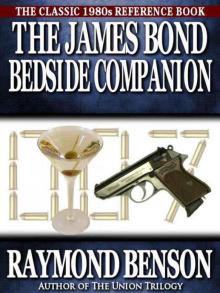 The James Bond Bedside Companion
The James Bond Bedside Companion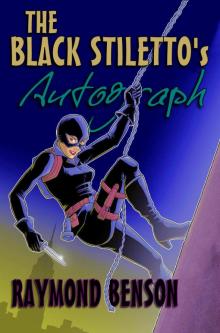 The Black Stiletto's Autograph
The Black Stiletto's Autograph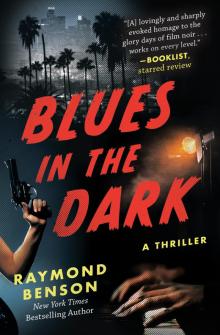 Blues in the Dark
Blues in the Dark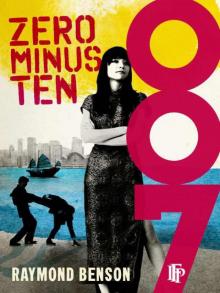 Zero Minus Ten
Zero Minus Ten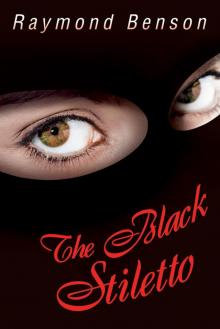 The Black Stiletto
The Black Stiletto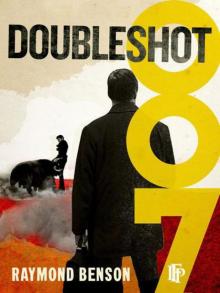 Doubleshot
Doubleshot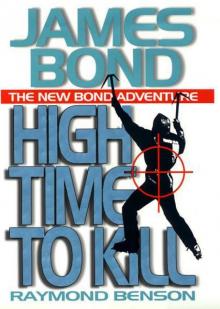 High Time To Kill rbb-3
High Time To Kill rbb-3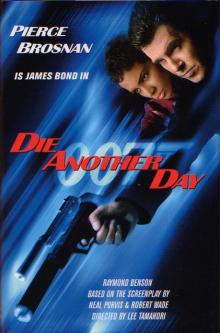 Bond Movies 07 - Die Another Day
Bond Movies 07 - Die Another Day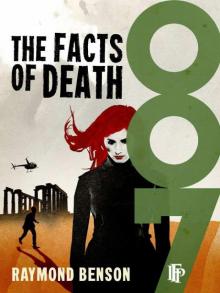 The Facts Of Death
The Facts Of Death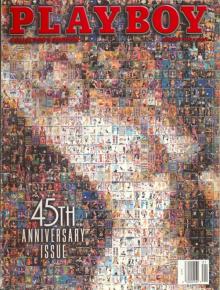 Midsummer Night's Doom
Midsummer Night's Doom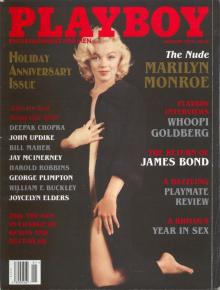 Blast from the Past
Blast from the Past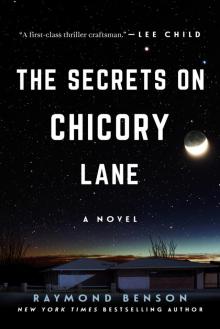 The Secrets on Chicory Lane
The Secrets on Chicory Lane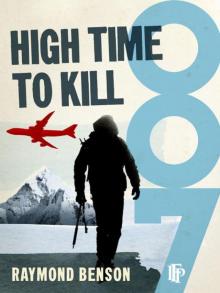 High Time To Kill
High Time To Kill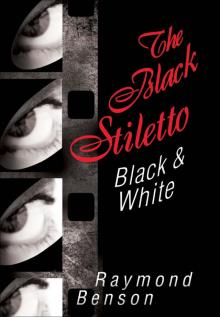 The Black Stiletto: Black & White
The Black Stiletto: Black & White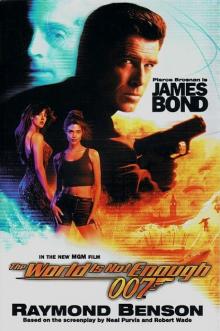 The World Is Not Enough jb-1
The World Is Not Enough jb-1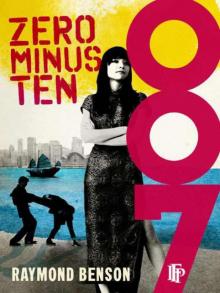 Zero Minus Ten rbb-1
Zero Minus Ten rbb-1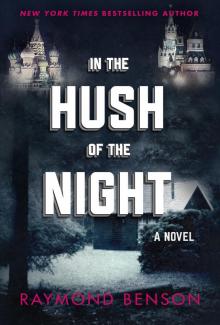 In the Hush of the Night
In the Hush of the Night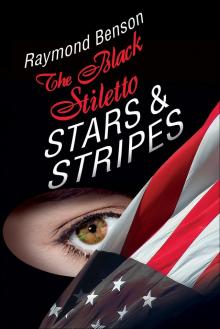 The Black Stiletto: Stars & Stripes
The Black Stiletto: Stars & Stripes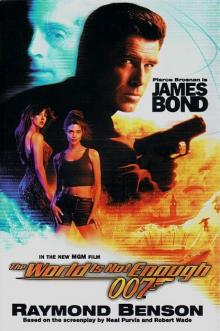 Bond Movies 06 - The World Is Not Enough
Bond Movies 06 - The World Is Not Enough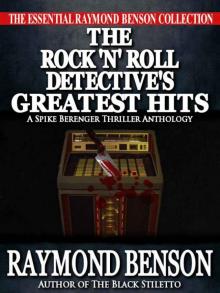 The Rock 'n Roll Detective's Greatest Hits - A Spike Berenger Anthology
The Rock 'n Roll Detective's Greatest Hits - A Spike Berenger Anthology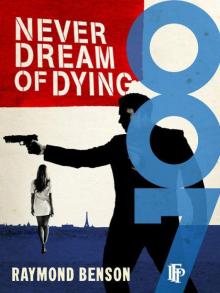 Never Dream Of Dying
Never Dream Of Dying